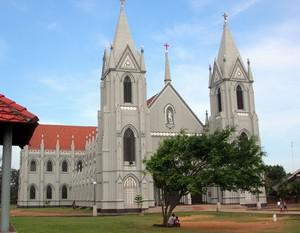Sri Lanka attacksNearly 300 killed, 500 injured in Easter Sunday attacks on churches, hotels in Sri Lanka
In the worst wave of terrorist violence in Sri Lanka in ten years, a series of blasts on Sunday have hit churches and hotels in and near the Sri Lankan capital, Colombo. The nearly simultaneous blasts targeted churches during Easter services and hotels frequented by foreign guests. Sri Lankan officials said 290 people, including at least 27 foreigners, had been killed in the blasts in Colombo and elsewhere. More than 500 more have been injured.

St. Sebastian's Church in Negombo, one of the churches attacked by terrorists in Sri Lanka // Source: commons.wikimedia.org
In the worst wave of terrorist violence in Sri Lanka in ten years, a series of blasts on Sunday have hit churches and hotels in and near the Sri Lankan capital, Colombo.
The nearly simultaneous blasts targeted churches during Easter services and hotels frequented by foreign guests. Sri Lankan officials said 290 people, including at least 27 foreigners, had been killed in the blasts in Colombo and elsewhere. More than 500 more have been injured.
A hospital source told AFP news agency that U.S., British, and Dutch citizens were among those killed in the explosions. The Chinese state newspaper People’s Daily said one Chinese national was also killed, while state news agency Xinhua said four others were injured. Portugal also confirmed one of its citizens was killed.
CNN reports that one church, St. Anthony’s Shrine, was in the north of the capital, Colombo, and another, St. Sebastian’s Church, in the nearby town of Negombo. The third church, Zion Church, was in the eastern town of Batticaloa, where a hospital official told AFP that more than 300 people were receiving treatment for injuries sustained in the blast.
Ruwan Wijewardene, the Sri Lankan defense minister, said Sunday that seven suspects had been arrested in connection with the blasts.
The three five-star hotels targeted by the terrorists were named as the Cinnamon Grand, the Kingsbury, and the Shangri-La, all in the center of Colombo.
Later on Sunday, two additional blasts occurred on the outskirts of Colombo. One of those explosions, at a hotel in the southern Colombo suburb of Dehiwala, killed two people, according to police. The other, in the north of the city, killed three police officers when the upper floor of a house they were searching collapsed.
The Sri Lanka government has imposed a curfew throughout the country. The Defense Ministry said the curfew would begin at 6:00 p.m. local time and end Monday at 6:00 a.m. local time. Police later issued a statement saying that the curfew would last “until further notice.”
The government also announced that major social media platforms and messaging apps had been blocked to prevent the spread of misinformation and rumors.
Prime Minister Ranil Wickremesinghe has convened an emergency meeting of the National Security Council following the blasts. He called in a tweet for Sri Lankans “to remain united and strong.”
The archbishop of Colombo, Malcolm Ranjith, called on the Sri Lankan government to punish those behind the attack “mercilessly, because only animals can behave like that.”
New Zealand Prime Minister Jacinda Ardern, whose country recently experienced deadly shootings at two mosques in which 50 died, condemned the attacks in Sri Lanka in a statement.
There have been no immediate claims of responsibility, but the government on Monday blamed a little-known radical Islamist group for the devastating Easter Sunday suicide bombings. Some Christian groups have spoken of facing growing intimidation by hard-line Buddhist monks in recent years. Members of the Buddhist community clashed last year with minority Muslims, with some Buddhists alleging that Muslims had been compelling people to convert to Islam.
Sri Lanka is a majority-Buddhist country, with Catholics making up only 6 percent of the population.
There were attacks on Catholics during the civil war, which ended in 2009. During the war, the nationalist Hindu Tamil Tigers, who fought for an independent Tamil country in north Sri Lanka, launched a series of bombings in public places, including Buddhist temples, Catholic churches, and popular tourist hotels.
What we know so far
• The government on Monday blamed a little-known radical Islamist group for the devastating Easter Sunday suicide bombings. Officials said the group, which had not carried out any serious attacks before, had received help from an international terrorist organization.
• The bombings began around 9:00 a.m., and targeted Roman Catholic churches — St. Anthony’s Shrine in Colombo, the capital; St. Sebastian’s Church in Negombo; and Zion Church in Batticaloa — and three luxury hotels: the Shangri-La, the Cinnamon Grand, and the Kingsbury, all in Colombo.
• Twenty-four suspects have been detained. Three officers were killed hunting for the attackers at a housing complex.
• Ten days ago, security officials were alerted to a threat to churches from a radical Islamist group, National Thowheeth Jama’ath. It was unclear what security measures, if any, were taken, or whether the attacks on Sunday were carried out by the Islamist group.
• The Sri Lanka government temporarily blocked major social media and messaging services, including Facebook and WhatsApp, to curb misinformation.
• At least thirty-five of the dead were foreigners, several of them Americans. Others were British, Chinese, Dutch and Portuguese.
